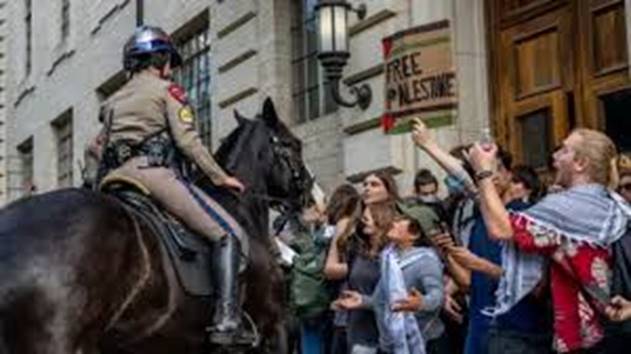

A dramatic stage in the protest against the Israeli war on Gaza opened when university students started to demonstrate – Picture BBC
Gaza Is Changing the US Political Landscape
By Dr Syed Amir
Bethesda, MD

Rejecting all pleadings from President Biden and ignoring pleas of the United Nations and International Criminal Court, as of this writing, Israeli Prime Minister Netanyahu is poised to launch a large-scale invasion of Rafah, where 1.3 million desperate Palestinians are sheltering. They are being told to leave, but there is nowhere to go; starvation, disease, and homelessness have been stalking them for the past six months.
Rafah is the only city in Gaza that has so far escaped the large-scale devastation wrought by the Israeli war machine. Netanyahu’s real aim is believed to be to drive the Palestinians out of Gaza and use the land for Jewish settlement. Protected by US support, Israel, which received 14 billion dollars, has flouted all safeguards to protect the weaker nations put in place in the aftermath of the Second World War.
In his bestselling book, The Hundred Years’ War on Palestine, Rashid Khalidi, the Edward Said professor of modern Arab studies at Columbia University, New York, has narrated how the Palestinians were dispossessed of their land and driven out of their homes by the creation of Israel. The story goes back a century, starting with the Balfour Declaration, made in 1917 by the then-British foreign secretary, Arthur Balfour, affirming the British government's support for a homeland for the Jewish people. Unfortunately, the creation of a homeland for the Jewish people has been a disaster for the native Palestinians.
The world’s attention currently is centered on the unfolding tragedy in Gaza. The strip has a sorry history. Egypt occupied Gaza for 19 years after the 1948-49 war. Then, it was captured by Israel following the rout of Arab armies in the 1967 war. In 2005, Israel lifted its occupation but kept control over its airspace, border, and shoreline. However, it left behind many farms, producing prodigious amounts of fruit and vegetables. Unfortunately, these did not survive for lack of care.
Hamas, the fundamentalist religious movement that took over Gaza after a bloody conflict with Fatah and the Palestinian Authority in 2007, did little to develop the territory. Instead, it continued a low-level conflict by firing primitive rockets over Israel that did little damage. Its leaders, not known for their wisdom or foresight, made a catastrophic mistake when they sent terrorists in October 2023 to Israel who killed at least 1,200 innocent Israeli men, women, and children.
The attack provoked a massive and barbaric retaliation from Israel. The Hamas leader, Yahya Sinwar, reportedly did not expect that Israel’s retaliation would be as devastating as it was. Why would any sane leader be so much out of touch with reality as to expect anything different from Israel and its current racist, extremist Government?
As of this writing, Israel has devastated the Gaza Strip and massacred some 35,000 Palestinians, mostly women and children. The world is appalled as pictures of innocent Palestinian men, women, and children, many disheveled and starving, are splashed across TV screens and newspaper pages.
These pictures have had a dramatic effect on the American public in changing their view of the Palestinian-Israeli conflict. Only a decade ago, it was a virtual taboo to criticize Israel, and for a politician, it would be a death knell. Now, people are openly critical of Israel’s onslaught on Gaza. Recent polls have shown that a clear majority of Americans disagree with Biden’s policies of total support for Israel. The disapproval is even higher when young Americans are polled.
A dramatic stage in the protest against the Israeli war on Gaza opened when university students started to demonstrate, demanding that their institutions remove any investment in Israeli companies while vocally showing support for a Free Palestine. Campus demonstrations are a long-held American tradition, as these serve to stoke public awareness of issues and shape public opinion.
Thus, there were strong demonstrations against the Vietnam War in the sixties, which, on May 4, 1970, resulted in the killing of four young students by the Ohio National Guard. Similarly, the students and faculty protested the apartheid system enforced by the white minority South African Government and demonstrated in support of the US Civil Rights Movement.
The anti-Israeli demonstrations, however, are a different story. The students were blamed by the media and some politicians for harassing Jewish students and promoting antisemitism, though there is no evidence that this happened on any significant scale. Several university presidents were summoned by the members of Congress, mostly Republicans, to be questioned for their failure to quash the protests. Presidents of Harvard and Pennsylvania Universities were forced to resign, while presidents of MIT and Columbia have managed to hang on to their jobs.
Student protests have, nevertheless, spread across the country and Europe. The protests have attracted many women, non-Muslims, and non-Palestinians. The specter of Police in riot gear and helmets battling young students on university grounds was an upsetting sight.
Paradoxically, the Muslim-Arab world has remained quiet. Several Arab- countries have diplomatic and trade relations with Israel. Except for Turkey, these have not been broken. The Arab kingdoms and Sheikhdoms are far more worried about Iran than Israel. They are reported to have helped Israel against Iranian air strikes, 300 projectiles, launched on April 14 in retaliation for the Israeli assassination of its diplomats.
The current political situation in the US is fraught because of the upcoming national elections in November. Biden and Trump will almost certainly be the two main presidential candidates. Trump is ensnared in various legal cases against him, but despite his ethical and moral turpitude, he has a solid base of support comprising White conservatives. Biden, who will be 82 years old in November, is dogged by concerns about his physical and cognitive health. Neither candidate draws much enthusiasm from the public.
American Muslims are in a quandary about whom to support. The new generation growing up in this country is unafraid to be involved in the political process. Muslims represent a significant segment of the electorate in a few crucial states, such as Michigan and New York, which can determine the election outcome. Biden, with his unquestioning support for Israel, has turned many Muslims and young voters against him. However, the alternative is even worse. Trump is avowedly anti-Palestinian and a greater supporter of Netanyahu. He has pledged that he would gratuitously ban the admission into the US of Muslims from certain countries, as he did in his previous term.
After passively watching for months the desolation of Gaza, Biden finally moved and threatened to ban the export to Israel of 2,500-pound bombs that can erase large blocks of populated areas. The mere threat has angered many Congressmen and Senators who are more rabid supporters of Israel. Many among them are Evangelical Christians and believe that their faith requires them to support Israel. Furthermore, the powerful Israeli lobby, AIPAC, heavily supports pro-Israel Senators and Congressmen in their election bids, donating millions of dollars. Finally, the world watches and waits while Netanyahu unleashes his invasion of Rafah in defiance of Biden’s edict.
(Dr Syed Amir is a former Assistant Professor, Harvard Medical School, and a health science administrator, US National Institutes of Health)

